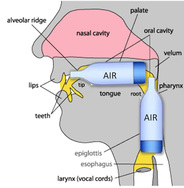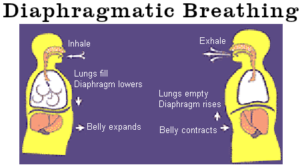All Voice Actors Breathe
I remember when I first got into voice over years ago, one of the very first things I had to learn was not to hold my breath.  Learning to actually incorporate breathing was hard. Voice actors need to learn how to breath and when to breathe. But being told to breath from your diaphragm and then automatically doing it at all the right places in the script are two very different things. That’s why this week fellow voice over coach Diana Birdsall and I invited Michelle Blenker into our Clubhouse room “Ask the VO Coaches.”
Learning to actually incorporate breathing was hard. Voice actors need to learn how to breath and when to breathe. But being told to breath from your diaphragm and then automatically doing it at all the right places in the script are two very different things. That’s why this week fellow voice over coach Diana Birdsall and I invited Michelle Blenker into our Clubhouse room “Ask the VO Coaches.”
Michelle Blenker is a well-established professional voice actor and coach. Michelle is the only coach we know who has developed a curriculum specifically for breathing and voice over. She began her vocal training as a young child, taking singing lessons in MA where she grew up. There Michelle learned a breathing methodology to protect the voice.
This practice is useful beyond VO, and would work for people in sales or public speaking as well Michelle noted. As both a trained opera singer and a graduate with a Speech and Hearing Science degree, Michelle has both the training in specific breathing programs and the knowledge and understanding of human anatomy to bring out the best in her voiceover students.
Does Your Voice Feel Tired After Recording All Day?
 We were eager to ask Michelle about vocal fatigue. Whether you are auditioning or doing booked work, often your voice feels tired as the day goes on. Our voice is a delicate instrument, Michelle explained. She said our entire being is used when we do voice over. We use our body but our vocal cords take the brunt of what we do so we need to use our whole body to support them. As we bring air into our larynx, we want the air to float through and we don’t want to push air in. She suggests that we reframe our thoughts about where our voice comes from and focus on the diaphragm.
We were eager to ask Michelle about vocal fatigue. Whether you are auditioning or doing booked work, often your voice feels tired as the day goes on. Our voice is a delicate instrument, Michelle explained. She said our entire being is used when we do voice over. We use our body but our vocal cords take the brunt of what we do so we need to use our whole body to support them. As we bring air into our larynx, we want the air to float through and we don’t want to push air in. She suggests that we reframe our thoughts about where our voice comes from and focus on the diaphragm.
How Can I Control My Breath More?
This is so common, from newbies to established professionals. Everyone wants to know how to best control their breath. Michelle cautions that if you sit, you often slouch which is problematic. In contrast, when you stand, you engage your legs. This provides a loosed base for your instrument. Apparently, most people barely use 40% of their air capacity!
 In order to increase this amount, you need to learn how to stand. Then, you need to engage your ribs and fill them more deeply with air. Lastly, you need to control how quickly the air is exhaled. When you learn to use your resonators properly, which are found in your sinuses and more, many voice talents discover that their true voice is actually higher than they realized.
In order to increase this amount, you need to learn how to stand. Then, you need to engage your ribs and fill them more deeply with air. Lastly, you need to control how quickly the air is exhaled. When you learn to use your resonators properly, which are found in your sinuses and more, many voice talents discover that their true voice is actually higher than they realized.
Interestingly, Michelle cautions that a lot of people mistakenly think their voice comes from their chest. It does not. Our vocal apparatus is actually suspended quite miraculously in air by muscle and just floats in the throat. That is why pushing too much air can be so destructive. Our instrument is so delicate. Unlike drums, we need to phonate healthfully to prevent our vocal cords from getting damaged.
How Do You Avoid Vocal Strain?
 It seems like that raspy sound is still popular. Still, just because they ask for it, this does not mean you have to provide it if that is not your natural vocal tone. When we speak, our vocal cords vibrate and bump into each other to create sounds. When this happens, we can get nodules. Then, the vocal cords don’t open and close properly. To prevent rasp, there is an exercise you can do:
It seems like that raspy sound is still popular. Still, just because they ask for it, this does not mean you have to provide it if that is not your natural vocal tone. When we speak, our vocal cords vibrate and bump into each other to create sounds. When this happens, we can get nodules. Then, the vocal cords don’t open and close properly. To prevent rasp, there is an exercise you can do:
- Take a deep breath in and learn how to control the flow of air
- Do this singing and speaking exercise:
-
- Very softly and gently sing “Hah-may-mah-mo-meh-moo” across keys
-
Diana noted that she always feels like when she practices such exercises she should do them stronger and louder. Michelle explained that in this case it’s experiential and you should feel the softness and then put power behind it.
 One of our attendees asked a question about promo reads. He said that when he tried to get deep resonance he loses his breath. Michelle confirmed that he stands and he said yes. She directed him to put one foot in front of the other. Then, he was told to tuck his bottom under to expand the back ribs. Michelle said that as he releases his breath he needs to control it and let it come through more slowly. She then told him to do the above exercise in the tucked stance, letting the air flow in and out like a balloon.
One of our attendees asked a question about promo reads. He said that when he tried to get deep resonance he loses his breath. Michelle confirmed that he stands and he said yes. She directed him to put one foot in front of the other. Then, he was told to tuck his bottom under to expand the back ribs. Michelle said that as he releases his breath he needs to control it and let it come through more slowly. She then told him to do the above exercise in the tucked stance, letting the air flow in and out like a balloon.
Another attendee wanted to know if cardio vascular exercise improves voice over endurance. She surmised that her best recording days are the days that she does her elliptical machine. Michelle suggested that your body is more oxygenated on work out days, so it is possible. She further instructed Lisa to work on practicing her breathing as she walks. To count her steps, and try to control her exhales as a means of learning to increase her breathing capacity.
We also had a touching chat with Keaston, a voice actor living with a spinal cord injury. Keaston has to sit all the time, so he was curious how this technique applies to him. I was fascinated to learn that like pilates, the technique that Michelle teachers her voice students was created for injured veterans after World War II. So, perhaps he could learn from it as well.
Final Thoughts and Breathing and VO
One of our regular attendees, Xavier, made an interesting observation. He noted that when he is really engaged in a script, you can’t hear him breathe and he incorporates the breath naturally. In the end, isn’t that the goal? To have good habits so that the breath flows naturally and all of these habits become second nature?


